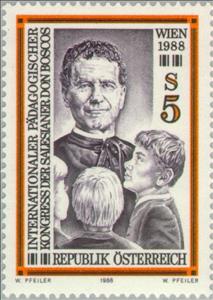Stamp: Don Bosco (1815-88) priest, educationalist & writer (Austria 1988)
Don Bosco (1815-88) priest, educationalist & writer (Austria 1988)
12 January (Austria ) within release Int. Pedagogic Congress goes into circulation Stamp Don Bosco (1815-88) priest, educationalist & writer face value 5 Austrian schilling
| Stamp Don Bosco (1815-88) priest, educationalist & writer in catalogues | |
|---|---|
| Michel: | Mi:AT 1909 |
| Yvert et Tellier: | Yt:AT 1738 |
Stamp is vertical format.
John Bosco (Italian: Giovanni Melchiorre Bosco), popularly known as Don Bosco, was an Italian Roman Catholic priest of the Latin Church, educator and writer of the 19th century, who dedicated his life to the betterment and education of street children, juvenile delinquents, and other disadvantaged youth and employed teaching methods based on love rather than punishment, a method known as the Salesian Preventive System. A follower of the spirituality and philosophy of Saint Francis de Sales, Bosco dedicated his works to him when he founded the Salesians of Don Bosco.Stamp Don Bosco (1815-88) priest, educationalist & writer it reflects the thematic directions:
In legal discourse, an author is the creator of an original work, whether that work is in written, graphic, or recorded medium. The creation of such a work is an act of authorship. Thus, a sculptor, painter, or composer, is an author of their respective sculptures, paintings, or compositions, even though in common parlance, an author is often thought of as the writer of a book, article, play, or other written work.In the case of a work for hire, the employer or commissioning party is considered the author of the work, even if they did not write or otherwise create the work, but merely instructed another individual to do so.
n Christian belief, a saint is a person who is recognized as having an exceptional degree of holiness, likeness, or closeness to God. However, the use of the term saint depends on the context and denomination. In Catholic, Eastern Orthodox, Anglican, Oriental Orthodox, and Lutheran doctrine, all of their faithful deceased in Heaven are considered to be saints, but a selected few are considered worthy of greater honor or emulation. Official ecclesiastical recognition, and veneration, is conferred on some denominational saints through the process of canonization in the Catholic Church or glorification in the Eastern Orthodox Church after their approval.In many Protestant denominations saint refers broadly to any holy Christian, without special recognition or selection.
Education sciences, also known as education studies or education theory, and traditionally called pedagogy, seek to describe, understand, and prescribe education including education policy. Subfields include comparative education, educational research, instructional theory, curriculum theory and psychology, philosophy, sociology, economics, and history of education. Related are learning theory or cognitive science.
A conference is a meeting, often lasting a few days, which is organized on a particular subject, or to bring together people who have a common interest. Conferences can be used as a form of group decision-making, although discussion, not always decisions, is the primary purpose of conferences. The term derives from the word confer.
Biologically, a child (plural: children) is a human being between the stages of birth and puberty. The legal definition of child generally refers to a minor, otherwise known as a person younger than the age of majority. Child may also describe a relationship with a parent (such as sons and daughters of any age) or, metaphorically, an authority figure, or signify group membership in a clan, tribe, or religion; it can also signify being strongly affected by a specific time, place, or circumstance, as in "a child of nature" or "a child of the Sixties". There are many social issues that affect children, such as childhood education, bullying, child poverty, dysfunctional families, child labor, hunger, and child homelessness. Children can be raised by parents, by fosterers, guardians or partially raised in a day care center.




